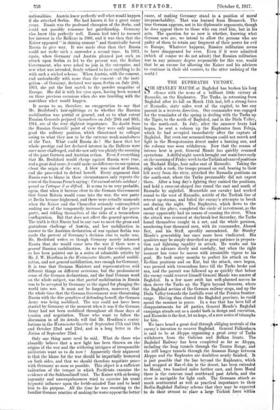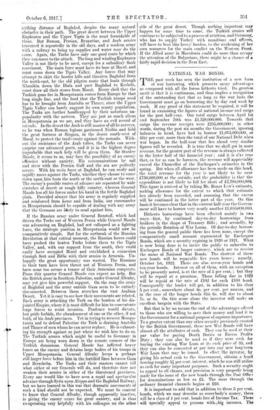THE EUPHRATES VICTORY.
SIR STANLEY MAUDE at Baghdad has broken his long silence with the news of a brilliant little victory at Ramadie, on the Euphrates. The Turks, in retreating from Baghdad after its fall on March 11th last, lefts strong force at Ramadie, sixty miles west of the capital, to bar any pursuit in a western direction.- commander was engaged for the remainder of the sprin in dealing with the Turks up the Tigris, to the north of Baghdad, and in the Dials. Valley, to the north-east. In July, after the summer heats had begun, he sent a column up the Euphrates from Feluja, which he had occupied immediately after the capture of Baghdad. But even our seasoned troops could not march and fight in the Mesopotamian desert under a burning sun, and the column was soon withdrawn. Now that the season of intense heat is past, General Maude has quickly resumed operations. A skilful night march brought our main force early oaths morning of Friday week to the Turkish advanced positions on Mushaid Ridge, four miles east of Ramadie. Taking the ridge with a rush, the troops pressed on and, bearing to their left away from the river, attacked the Ramadie positions on the south-east, where the Turks presumably did not expect them. After a long day's fighting they carried the positions, and held a crescmt-shaped line round the east and south of Rainadie by nightfall. Meanwhile our cavalry had worked round to the west of Ramadie, astride of the Turkish line of retreat up-stream, and foiled the enemy's attempts to break out during the night. The Euphrates, which flows to the north of the place, completed the circle of investment, as the enemy apparently had no means of crossing the river. When the attack was resumed at daybreak last Saturday, the Turks found themselves caught in a net, and the whole garrison, numbering four thousand men, with its commander, Ahmed Bey, and his Staff, speedily surrendered. Sir Stanley Mande's generalship has once more been vindicated. His qualities may be simply described as great patience in prepara- tion and lightning rapidity in attack. He works out his plans in advance slowly and carefully, but when the right moment has come he moves with irresistible vigour to his goal. He took many months to perfect his attack on the Es-Sinn positions and on Kut, but the attack, once begun, was pressed with tremendous force till the Turks broke and ran, and the pursuit was followed up so quickly that before the enemy could recover himself General Maude was master of Baghdad. In a few more swift but well-planned moves he then drove the Turks up the Tigris beyond Samarra, where the Baghdad section of the German railway stops, and up the Dials Valley towards the foothills west of the Persian frontier- range. Having thus cleared the Baghdad province, he could spend the summer in peace. In a war that has been full of disappointments for all parties, General Maude's Baghdad campaign stands out as a model both in design and execution, and Ramadie is the first, let us hope, of a new series of triumphs for him.
We have heard a great deal through obliging neutrals of the enemy's intention to recover Baghdad. General Falkenhayn is said to be at Aleppo organizing a great army of Turks withdrawn from the Galician and Balkan fronts. The Baghdad Railway has been completed as far as Aleppo, including, the long tunnels through the Taurus Range, and the still longer tunnels through the Amanus Range between Aleppo and the Euphrates are doubtless nearly finished. It is just possible that the line beyond the Euphrates, which had stopped at Ras-el-Ain in the desert, has been extended to Mosul, two hundred miles further east, and from Mosul there is the caravan road southward past Arbela, and the river is navigable for light craft. The Germans attach so much sentimental as well as practical importance to their Berlin-Baghdad Railway scheme that they may be expected _:to do their utmost to place a large Turkish force within striking distance of Baghdad, despite the many natural obstacles in their path. The great desert between the Upper Euphrates and the Upper Tigris is the mist formidable of these. But Roman, Persian, Byzantine, and Arab armies traversed it repeatedly in the old days, and a modern army with a railway to bring up supplies and water may do the tame. Again; the Turks have only one good route by which they can move to the attack. The long and winding Euphrates Valley is not likely to be used, except for a subsidiary flank movement. The main force must have its base at Mosul, and must come down the Tigris Valley. Any forces that may attempt to skirt the border hills and threaten Baghdad from the north-east, by the old pilgrim route that leads through Khanikin down the Dials and past Baghdad to Kerbela, must draw all their stores from Mosul. Every shell that the Turkish guns fire in Mesopotamia comes from Europe by that long single line, and the food that the Turkish troops need has to be brought from Anatolia or Thrace, since the Upper Tigris Valley can barely support its own scanty population. The Turks are further handicapped by their notorious un- popularity with the natives. They are just as much aliens in Mesopotamia as we are, and they have an evil record of misrule. In the desert the Arab is still master of all he surveys. as he was when Roman legions garrisoned Nisibis and held the great fortress at Singara, in the desert south-west of Mosul, to protect the trade-route against the nomads. With- out the assistance of the Arab tribes, the Turks can never surprise our advanced posts, and it is in the highest degree improbable that such help will be given them. Sir Stanley Maude, it seems to us, may face the possibility of an enemy offensive without anxiety. His communications by rail and river with the Persian Gulf and the sea are perfectly secure. With his main force at Baghdad, he can easily and rapidly move against the Turks, whether they choose to come down upon him from the north or the north-east or the west. The enemy's possible routes of advance are separated by wide stretches of desert or rough hilly country, whereas General Maude has all his forces under his hand in the fertile Baghdad plain. Provided always that his army is regularly supplied and reinforced from home and from India, our commander in Mesopotamia should be capable of dealing with any army that the Germans are likely to send against him.
If the Russian army under General Baratoff, which had driven the Turks out Of Western Persia while General Maude was advancing on Baghdad, had not collapsed as a fighting force, the strategic position in Mesopotamia would new be comparatively simple. But for the outbreak of the Russian Revolution at that critical moment, the Russian forces could have pushed the beaten Turks before them to the Tigris Valley, and, with our support from the south, they could easily have occupied Mosul and established a connexion through Sect and Bitlis with their armies in Armenia. Un- happily the great opportunity was wasted. The Russians in their turn have been thrust out of Western Persia, and have none too secure a tenure of their Armenian conquests. From this quarter General Maude can expect no help. But the British army in Southern Palestine, under General Allenby, may yet give him powerful support. On the map the army of Baghdad and the army outside Gaza seem to be entirely disconnected. Between them stretches the vast Arabian Desert. Yet it is easy to see how their movements are related. Each army is attacking the Turk on the borders of his dis- jointed Empire, where it is most difficult for him to concentrate large forces to resist invasion. Prudence would dictate, but pride forbids, the abandonment of one or the other, if not both, of his Arab provinces. Yet in trying to recover Mesopo- tamia and to defend Palestine the Turk is draining Anatolia and Thrace of men whom he can never replace. He is exhaust- ing his strength against us just where we wish him to do so. The Turkish armies which might be useful to Germany in Europe are being worn down in the remote corners of the Turkish dominions. General Maude has inflicted heavy losses on the enemy and detains large bodies of his troops in Upper Mesopotamia. General Allenby keeps a perhaps still larger force before him in the fortified lines between Gaza and Beersheba. The Turks and their masters cannot tell what either of our Generals will do, and therefore dare not weaken their armies in either of the threatened provinces. Every one would like to have seen a rapid and spectacular advance through Syria upon Aleppo and the Baghdad Railway, but we have learned in this war that dramatic movements of such a kind should not be expected. We must be content to know that General Allenby, though apparently inactive, is giving the enemy -cause for great anxiety, and is thus co-operating very helpfully with his colleague °xi the other
side of the great desert. Though nothing important may happen for some time to come, the Turkish armies will continue to be subjected to a process of attrition, and Germany, who has to supply Turkey with munitions and officers, will have to bear this heavy burden, to the weakening of her own resources for the main conflict on the Western Front. If the Allied army in Macedonia could do more than occupy the attention of the Bulgarians, there might be a chance of a fairly rapid decision in the Near East.





























 Previous page
Previous page